Some Chaucer Factlets
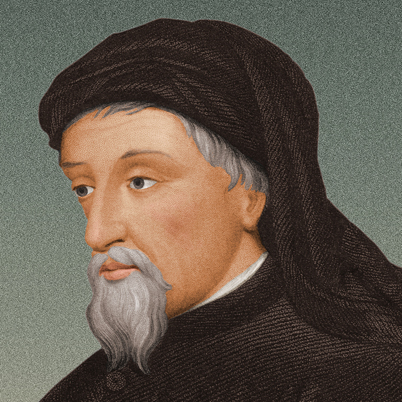
If you thought that Geoffrey Chaucer was only a middle English poet and writer then we have some Chaucerian faclets to show that he was this, and a lot more.
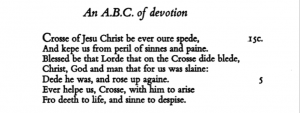 One of Chaucer’s earliest poems was ‘An ABC’, an acrostic which he wrote for people to use in prayer. Like much of Chaucer’s work, ‘An ABC‘ was a Middle English translation of a French work, in this case a prayer written by Guillaume de Deguileville. Each of the 26 eight-line stanzas begins with a successive letter of the alphabet. Probably written in the 1370s, the poem shows Chaucer’s art in its early stages of development. (Chaucer had been born in London around 1343 – the precise date of his birth is not known.)
One of Chaucer’s earliest poems was ‘An ABC’, an acrostic which he wrote for people to use in prayer. Like much of Chaucer’s work, ‘An ABC‘ was a Middle English translation of a French work, in this case a prayer written by Guillaume de Deguileville. Each of the 26 eight-line stanzas begins with a successive letter of the alphabet. Probably written in the 1370s, the poem shows Chaucer’s art in its early stages of development. (Chaucer had been born in London around 1343 – the precise date of his birth is not known.)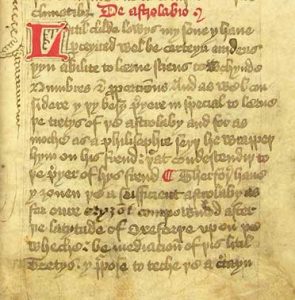 Chaucer also wrote an early work of popular science: his Treatise on the Astrolabe is possibly the first science book written in English, dating from around 1391. It is also perhaps one of the first books in English written for children – many critics believe it was written for Chaucer’s own son, Lewis. (Chaucer’s surname, by the way, derives from the French chausseur, ‘shoemaker’.)
Chaucer also wrote an early work of popular science: his Treatise on the Astrolabe is possibly the first science book written in English, dating from around 1391. It is also perhaps one of the first books in English written for children – many critics believe it was written for Chaucer’s own son, Lewis. (Chaucer’s surname, by the way, derives from the French chausseur, ‘shoemaker’.)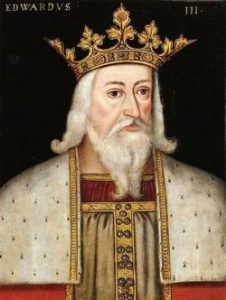 On St. George’s Day 1374, Edward III granted Geoffrey Chaucer a gallon of wine for every day for the rest of the poet’s life. In the same year, Chaucer was made comptroller (a sort of financial overseer or manager) of London customs – a lucrative and highly-sought position. His wine-stipend lasted for just four years: Geoffrey Chaucer shortly after Edward III died in 1377 and Richard II acceded to the throne, the wine allowance was turned into a monetary stipend.
On St. George’s Day 1374, Edward III granted Geoffrey Chaucer a gallon of wine for every day for the rest of the poet’s life. In the same year, Chaucer was made comptroller (a sort of financial overseer or manager) of London customs – a lucrative and highly-sought position. His wine-stipend lasted for just four years: Geoffrey Chaucer shortly after Edward III died in 1377 and Richard II acceded to the throne, the wine allowance was turned into a monetary stipend. He was charged with ‘rape’. Especially for a poet who may have had a hand in inventing our modern idea of Valentine’s Day, this may come as something of a shock and disappointment. Chaucer the great poet, also a possible rapist? But the incident is something of a mystery: ‘rape’ in the fourteenth century was a term also applied to abduction (the word has its origins in the Latin rapere, ‘seize’), so it’s not clear whether Chaucer’s crime was kidnapping or something even worse, or, perhaps, something else altogether. In 1380 one Cecily Chaumpaigne released Chaucer from ‘all manner of actions such as they relate to my rape or any other thing or cause’ (this is the English translation of the court rolls, which were written in Latin). But what was the ‘rape’ Chaumpaigne referred to here? We’ll probably never know – but there is more information about the ‘Chaucer rape case’ here.
He was charged with ‘rape’. Especially for a poet who may have had a hand in inventing our modern idea of Valentine’s Day, this may come as something of a shock and disappointment. Chaucer the great poet, also a possible rapist? But the incident is something of a mystery: ‘rape’ in the fourteenth century was a term also applied to abduction (the word has its origins in the Latin rapere, ‘seize’), so it’s not clear whether Chaucer’s crime was kidnapping or something even worse, or, perhaps, something else altogether. In 1380 one Cecily Chaumpaigne released Chaucer from ‘all manner of actions such as they relate to my rape or any other thing or cause’ (this is the English translation of the court rolls, which were written in Latin). But what was the ‘rape’ Chaumpaigne referred to here? We’ll probably never know – but there is more information about the ‘Chaucer rape case’ here.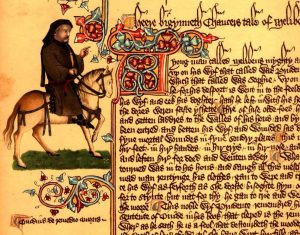 He was an MP. In 1386, Chaucer was a Member of Parliament for Kent. In those days, Parliament sat for just two months a year, in October and November, and Chaucer was only returned as MP for one year. So his political career was hardly long-lasting. But it was eventful. Chaucer’s Parliament of 1386 would go down in history as the ‘Wonderful Parliament’, which responded to King Richard II’s extravagant expenditure (and lavishing of gifts upon his favourites) by appointing fourteen Commissioners to keep tabs on Richard’s money. Chaucer’s son Thomas would later be Speaker of the House of Commons.
He was an MP. In 1386, Chaucer was a Member of Parliament for Kent. In those days, Parliament sat for just two months a year, in October and November, and Chaucer was only returned as MP for one year. So his political career was hardly long-lasting. But it was eventful. Chaucer’s Parliament of 1386 would go down in history as the ‘Wonderful Parliament’, which responded to King Richard II’s extravagant expenditure (and lavishing of gifts upon his favourites) by appointing fourteen Commissioners to keep tabs on Richard’s money. Chaucer’s son Thomas would later be Speaker of the House of Commons.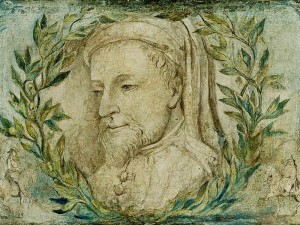 Chaucer died in 1400; the date on his tomb in Westminster Abbey reads 25 October. He became the first person to be buried in Poets’ Corner, though it wouldn’t become known by that name until the 16th century, and Chaucer was buried in the Abbey not for his poetry but because he had been Clerk of Works at the Palace of Westminster. However, although it was bureaucratic service rather than poetic achievement which earned Chaucer his place in the Abbey, his interment there would inspire the creation of Poets’ Corner in the 1550s.
Chaucer died in 1400; the date on his tomb in Westminster Abbey reads 25 October. He became the first person to be buried in Poets’ Corner, though it wouldn’t become known by that name until the 16th century, and Chaucer was buried in the Abbey not for his poetry but because he had been Clerk of Works at the Palace of Westminster. However, although it was bureaucratic service rather than poetic achievement which earned Chaucer his place in the Abbey, his interment there would inspire the creation of Poets’ Corner in the 1550s.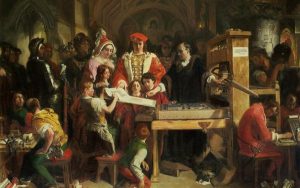 In 1998, an original Caxton printing of Chaucer’s Canterbury Tales sold at auction for $7.4 million. William Caxton printed The Canterbury Tales in 1477, just two years after printing his first book, “Recuyell of the Historyes of Troye”, the first book printed in English (though it was actually printed outside of England, in Bruges).
In 1998, an original Caxton printing of Chaucer’s Canterbury Tales sold at auction for $7.4 million. William Caxton printed The Canterbury Tales in 1477, just two years after printing his first book, “Recuyell of the Historyes of Troye”, the first book printed in English (though it was actually printed outside of England, in Bruges).






